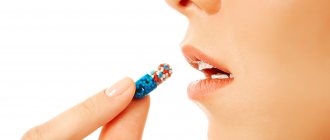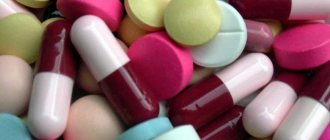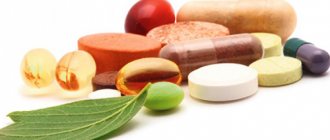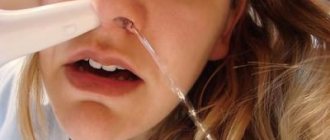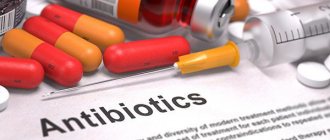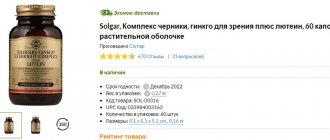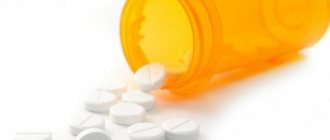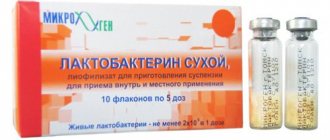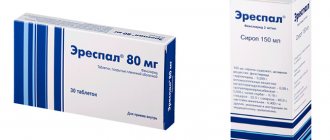Symptoms of the disease
As a rule, the symptoms of sinusitis are as follows:
- Frequent throbbing migraine, the pain of which radiates to the teeth.
- Swelling of pus in the nasopharynx and flowing out through the nose.
- Persistent and prolonged nasal congestion, due to which the sense of smell disappears.
- Feeling of pressure in the cheeks, brow ridges and nose.
- Standard symptoms for infectious diseases: general weakness and malaise.
The initial stages of the disease can be easily cured using standard antibacterial agents.
The difficulty is that it is impossible for a non-specialist to identify the symptoms of the initial stage. Therefore, the disease often reaches a stage where it can only be cured with antibiotics.
If antibiotic treatment is not carried out, the infection can lead to the following complications: meningitis, lifelong loss of smell, infection spreading to the trachea, bronchi and eyes. Facial bone destruction is also possible.
Cases when antibiotics should not be taken
To determine which antibiotics to take for sinusitis, a specialist must identify the symptoms and the causative agent of the infection. Further treatment depends only on the root cause of the disease. If there is a mistake, antibiotics will only make the situation worse. These medications are not prescribed in the following cases:
- If sinusitis is of viral and fungal origin.
- For chronic sinusitis.
- For sinusitis caused by an allergic reaction.
- The disease is in a mild stage.
When treating sinusitis, antibiotics are selected individually for each patient. Only doctors prescribe the dose. Adding or subtracting the number of techniques without permission is strictly prohibited.
The specialist always prescribes a specific course of treatment, the duration of which is no more than 1 month. The prescribed medicine should not be taken for more than the indicated period; at the end of the course you should consult a doctor. If you take antibiotics for too long, the infection will become resistant to them.
If new symptoms appear while using antibiotics, you should immediately consult your doctor. The same applies to the body’s inadequate response to the drug.
For sinusitis, the antibiotic should not be mixed with alcohol. When purchasing a drug, be sure to pay attention to the expiration date.
Due to the fact that these medications are selected individually, the best antibiotic for sinusitis is the one that showed its effect within the first 2 days. If there is no effect, the doctor may prescribe another medicine.
What antibiotics to take for sinusitis in adults?
The prescription of antibacterial therapy is the basis in the treatment of lesions of the upper respiratory tract, as well as other infectious diseases.
The goal of antibiotic therapy is to suppress the development of bacteria. Antibiotics are used both for acute forms of pathology and for chronic cases. If the doctor diagnoses acute sinusitis, an increased dose of antibiotic is prescribed; the treatment itself lasts no more than 7 days. Chronic sinusitis requires longer treatment, sometimes up to 4 weeks.
Antibiotic therapy involves not only eliminating the infection, but also preventing complications. And also, if local drugs do not help in treating the disease.
Important
We should not forget that all antibiotics should be taken strictly as recommended by a doctor, especially when treating children and pregnant women. It is believed that the injectable form of antibiotics is the most effective, however, there are a number of tablet preparations that are no less effective.
Below we will consider the main drugs and treatment methods that are prescribed for the treatment of sinusitis (sinusitis).
Macrolide drugs
These are the safest, but no less effective drugs. Prevents the growth of bacteria and the development of infection, suitable for both acute and chronic disease. The most popular medications in this group are the following:
Azithromycin. Not an expensive drug, it has an antimicrobial effect. Not recommended for people with liver disease or a possible allergy to one of the components of the medicine. Erythromycin. The action is similar to penicillins. Not effective against gram-negative microorganisms. It does not have many side effects, and is often prescribed to patients with allergies to penicillin drugs. Source: nasmorkam.net
Betalactam agents
Another equally well-known antibiotics - drugs of the beta-lactam group, have a natural basis. They are quite gentle with a minimum of side effects, but are active against limited types of bacteria.
Amoxicillin. Quite effectively destroys streptococci and gram-negative bacilli. It is a gentle drug because it does not have a negative effect on the body. However, it is intended for short-term use, since bacterial agents quickly adapt to the active substance of this drug. Augmentin. Refers to protected penicillins (with the addition of clavuanic acid). Actively inhibits bacterial growth and is a broad-spectrum antibiotic. With the correct dosage it does not cause severe side effects.
Cephalosporin series
Cephalosporins actually belong to the penicillin series, but are more effective. Drugs in this group actively destroy bacteria that develop during sinusitis. Today, the most famous is ceftriaxone, which is a 3rd generation antibiotic.
Ceftriaxone. A popular drug, it has a wide spectrum and effectively acts on pathogenic flora. Often prescribed for sinusitis, however, the drug has quite a lot of side effects. Therefore, treatment with this medicine is not recommended during pregnancy and children.
Sometimes a specialist may prescribe drugs of the tetracycline group. They have an antimicrobial effect, but are intended for topical use only. For this reason, they are used as independent means for treatment. It is advisable to prescribe as an additional drug.
It is important to remember that treatment with medications should be carried out under the supervision of an ENT doctor. Be sure to take only the prescribed course of antimicrobial drugs, follow the dosage, and if side effects occur, immediately contact your doctor.
to the content?
Tablet antibiotics
Antibiotics for sinusitis in tablets are the most common. They can be stored longer without losing their medicinal properties.
- Macropen
Macropen tablets are effective as they destroy pneumococcal bacteria and Haemophilus influenzae. In small proportions, the product produces a bacteriostatic effect: it does not allow bacteria to multiply, in large quantities it has a bactericidal effect and destroys microbes.
It is convenient to treat sinusitis with Macropen because it eliminates the infection even in an advanced state. Bacteria hardly adapt to it. However, it should not be used if you have kidney or liver problems.
- Augmentin
Pharmacists classify Augmentin, a fairly effective antibiotic, as a 3rd generation medicine. Thanks to its complex semi-synthetic composition, it has a wide range of applications. The principle of action is aimed at destroying bacterial cells.
Augmentin has proven itself well in many other infectious diseases, which in most cases are not associated with the respiratory tract. If necessary, it can be taken to infants only in crushed form. This drug has the worst effect on the liver and intestines, so it should not be used for more than 14 days.
- Ceftriaxone
Treatment of sinusitis with antibiotics is impossible to imagine without penicillin drugs. One of these is Ceftriaxone, a 3rd generation medicine. Since it is intended to destroy aerobic and anaerobic bacteria, the drug is most often prescribed for infectious diseases of the respiratory system. The principle of action of the drug is based on the fact that it does not allow bacteria to multiply.
This antibiotic for sinusitis eliminates pathogenic microbes even in the most advanced form. They need to treat infectious diseases when previous medications have not brought results. As a rule, patients note an improvement in their condition within a day after use.
Despite its effectiveness, Ceftriaxone has the greatest number of side effects: disruption of the digestive tract and kidney function. Strictly contraindicated for pregnant women and children under 16 years of age.
- Sumamed
A first-rate antibiotic for the treatment of sinusitis, Sumamed destroys both gram-positive and gram-negative microorganisms. Adopted in 2014, the drug became the first macrolide-type antibiotic that can be freely purchased at the pharmacy. The principle of action is the intracellular destruction of bacteria.
The advantage of Sumamed: use for a wide range of diseases and release in many forms. The course of treatment is quick (no more than 5 days). The use of this drug is contraindicated for children and pregnant women. The drug is not prescribed to people with weakened kidneys and liver.
- Amoxiclav
Amoxiclav is a semi-synthetic medicine that is used for many types of infectious diseases. If you have sinusitis, you should drink it to restore electrolyte balance. Amoxiclav tablets destroy the membrane of microorganisms by combining clavulonic acid and the main substance (name - amoxicillin). Suitable for pregnant women and children with the correct dosage.
The disadvantages include all the standard contraindications of antibiotics—disorders of the digestive tract.
It is possible that patients may develop urticaria due to individual intolerance. Only a doctor knows what antibiotics are used to treat sinusitis, so he selects the remedy individually for each person.
Injectable antibiotics
Antibiotic injections for sinusitis are used in cases where the disease has led to complications. In most cases, injection therapy is carried out under the close supervision of a physician in an inpatient hospital setting. Often, antibiotics for the treatment of subcutaneous sinusitis are dissolved tablet forms.
Ceftriaxone in the form of an injection is most often prescribed to patients. This penicillin-based drug is used in the most acute stages of the disease. It is administered subcutaneously once a day. The drug is quite effective, but pregnant women should not take it.
The injectable antibiotic Cefazolin, prescribed in extreme cases, is a semi-synthetic medicine with a bactericidal principle of action. It is used mainly in hospital settings once a day.
Instillation of antibiotics into the nose for sinusitis is an additional measure in conjunction with other methods of treatment. However, sprays and aerosols are not intended to make breathing easier. Rules for accepting these funds:
- Antibiotic spray, along with other drugs of this type, can only be prescribed by a doctor.
- You should not put more in your nose than the doctor prescribed.
- If the medicine does not bring results, you should consult a specialist, but under no circumstances increase the dosage. You cannot decide on your own how to treat the problem.
- Aerosols should not be used as a cleaning agent.
- In order for aerosols to work better, it is necessary to use vasoconstrictor nasal medications (Otilin or Farmazolin) between doses.
The drug Isofra is the most common among other aerosols; it is convenient to take with you, even if the patient has to fly somewhere. It contains framycetin sulfate, an antibiotic that is absorbed into the mucous membrane and subsequently destroys bacteria. Isofra copes well with catarrhal complications of a viral infection in the form of sinusitis. Treatment of purulent sinusitis is not carried out with this remedy.
If used incorrectly, Isofra aggravates sinusitis in adults to the point where bacteria become more resistant to antibiotics. Possible disturbances in the functioning of the gastrointestinal tract.
Bioparox spray contains the active substance fusafungin. Treatment of sinusitis with antibiotics of this type follows a similar principle. Therapeutic substances are absorbed into the mucous membrane, where they destroy bacteria.
However, it is prescribed only for the initial stages of the disease. Bioparax does not act in acute stages; it is not used to treat purulent sinusitis. In individual cases, the drug can cause allergic reactions of the mucous membrane, as well as rash and swelling. The occurrence of bronchospasms is possible.
Antibiotics for sinusitis
Antibiotics are prescribed for sinusitis in adults in tablets, injections (injections), sprays, drops. Drugs are selected depending on what type of pathogen caused the development of the disease. This should only be done by a qualified specialist after conducting detailed medical examinations.
The patient’s task is to follow the prescribed dosages and courses of therapy, notify the doctor about the appearance of uncharacteristic symptoms and the concomitant use of other medications.
The most basic groups of antibiotics are macrolides, fluoroquinolones, penicillins, and cephalosporins. It is worth noting that penicillins are most often prescribed. Macrolide antibiotics are used when the patient has intolerance to the penicillin series. Fluoroquinolones and cephalosporins are prescribed when other groups of antibacterial drugs have not had a therapeutic effect. So, what antibiotics are taken for sinusitis?
In tablet form
When treating sinusitis, such antibacterial drugs are often prescribed in tablet form.
| Name | Pharmacodynamics | How to use | Contraindications | Group |
| Macropen | It has a detrimental effect on bacterial microflora (pneumococcus, Haemophilus influenzae) using the active ingredient midecamycin. | Three times a day, 400 mg for 2 weeks. | Liver dysfunction, childhood (up to 3 years) | Macrolides |
| Augmentin | It has antibacterial and bactericidal effects due to clavulanic acid. | When treating sinusitis, take one tablet 3 times a day. The amount of active ingredient in 1 tablet is determined depending on the causative agent of the disease. | Phenylketonuria, weight less than 40 kg, functional liver disorders. | Belongs to the group of penicillins. |
| Ampicillin | An inexpensive drug for the treatment of sinusitis. Prescribed for chronic forms of the disease and in the acute stage. Has an antimicrobial effect. In addition to sinusitis, it treats otitis media, frontal sinusitis, bronchitis, sinusitis, meningitis, tissue abscess, etc. | Treatment in adults is carried out 4 times a day before meals. Single dose – 250-500 ml. | Lymphocytic leukemia, mononucleosis caused by infectious agents, antibiotic colitis, liver dysfunction, age up to 1 month. | Penicillin |
| Summed | The bacteriostatic effect is due to the active component – azithromycin. | Used to treat sinusitis for no more than 3 days. Regular use is limited to a single dose of 500 mg. | Liver dysfunction, children under 12 years of age. | Macrolides-azalides. |
| Flemoxin Solutab | It has an antibacterial and bactericidal effect due to ammoxicillin. | Sinusitis should be treated within a week. Single dose – 500 mg. Taken 2 times a day, regardless of food consumption. | Mononucleosis, lymphocytic leukemia, kidney dysfunction. Pregnant and lactating women and children are also not allowed to take the drug. | Antibiotic for sinusitis and sinusitis in adults of the penicillin series. |
| Amoxicillin | Amoxiillin for sinusitis destroys bacterial cell walls due to the amoxicillin component | 500 mg 3 times a day. The course of treatment for sinusitis is 5-12 days. | Hay fever, bronchial asthma, mononucleosis, lymphocytic leukemia, viral infections. | Penicillins. |
| Tsifran | The antimicrobial effect is due to ciprofloxacin. | 500 mg every 2 hours for 5-7 days. | Pregnancy, lactation. | Fluoroquinolones. |
Pricks and injections
How to treat moderate and severe sinusitis? Here injections and injections are often prescribed. Thus, the antibacterial effect occurs much earlier, in contrast to the tablet form. In addition, inflammation in the maxillary sinuses is quickly eliminated, and the development of dangerous complications is reduced to zero. Antibiotic therapy is prescribed in the following cases:
- copious discharge of purulent components, accompanied by severe pain;
- serious condition of the patient;
- intensity of symptoms.
What are effective antibiotics for sinusitis?
- Ceftriaxone. Belongs to the group of third generation cephalosporins. It is cheaper than its analogues, it can be used by both children (up to 1 month) and adults. It is produced in the form of a white powder for the preparation of an injection solution. They need to be treated for at least 4 and no more than 12 days. Injections are carried out 2-3 times a day.
- Cefazolin. And again a group of cephalosporins that have an antibacterial effect. It is administered both intramuscularly and intravenously. The course of treatment and frequency of injections are the same as with the previous drug.
- Gentamicin. Belongs to the group of aminoglycosides. Injected into a vein and muscle. Indicated for sinusitis: 1.7 mg per 1 kg of weight. The medicine is used 2-4 times a day for 7-10 days.
- Azithromycin. Representative of the macrolide group. Quickly kills bacterial flora. The standard dose is 1 bottle of powder per day. You need to be treated for 2-4 days. Then, after the symptoms disappear and the patient feels improvement, the doctor will prescribe Azithromycin tablets.
The following are prescribed as injectable drugs for the treatment of sinusitis: Amoxicillin, Ampicillin, Cefotaxime.
The use of hot injections for inflammation of the maxillary sinuses is also often prescribed. The introduction of calcium will help increase systemic blood flow. Its use is also advisable for the rapid distribution of the drug throughout the body. In this case, antibacterial therapy is much more effective.
For topical use
Sprays for irrigation of the nasal cavity and drops for sinusitis with an antibiotic are used as local preparations. They have pronounced anti-inflammatory and antibacterial effects. How to treat sinusitis?
- Spray Isofra. Refers to aminoglycosides. The main active ingredient is framycetin. You only need 1 injection 6 times a day for 7-10 days to completely kill pathogenic microflora.
- Rinil. Refers to aminoglycosides. Spray and drops for sinusitis with an antibiotic are used for 7 days. In total, you need 1 injection into each nostril 3 times a day.
- Polydexa in the form of a spray. Prescribed in case of purulent complications. Has vasoconstrictor, anti-inflammatory effects. The main active ingredients are: polymyxin, neomycin, dexamethasone. Apply 5 times a day, 1 injection. Chicken treatment – 7 days.
- Bioparox. Indicated for inflammatory and infectious diseases of the nasal cavity. Available in aerosol form. Fusafungine has a detrimental effect on bacterial microflora. It has anti-inflammatory, anti-edematous, vasoconstrictor effects. You need to inject once 4 times a day. The course of treatment is 7 days.
Is it possible to cure sinusitis using only topical medications with an antibiotic? In severe forms, no. In this case, antibacterial drugs in the form of aerosols and drops are prescribed in combination with tablet antibiotics.
Antibiotics for adults and children
For sinusitis in adults, treatment is used with standard antibacterial agents, and antibiotics are prescribed if absolutely necessary. For adults who are allergic to penicillin, doctors prescribe macrolide medications.
If the patient has bronchial asthma, he is prescribed fluoroquinolone drugs: Levolet, Tsiprolet, Tsifran. These drugs are less harmful, but they take longer to heal.
Antibiotics for purulent sinusitis are used in limited quantities. As a rule, macrolides, penicillins and cephalosporins are used for such a disease. However, the most basic method of treating purulent sinusitis is rinsing the nose in a hospital setting.
What antibiotics should children take for sinusitis? For the most part, it depends on the dosage of the drug and the age of the child. Typically, specialists do not prescribe tablets to small patients, preferring aerosols and drops in order to more accurately measure the dose. Most often, Bioparox spray is used for treatment (from 2.5 years). In case of complications, Ceftriaxone is prescribed by injection.
The list of antibiotic drugs for sinusitis for children is very limited, but the following drugs do not cause concern among pediatricians:
- Sumamed is an antibiotic for sinusitis in tablets that can be used by children over 12 years of age. Until this age, the medicine is administered intramuscularly.
- Amoxicillin. It is possible to treat childhood sinusitis with an antibiotic from the moment of birth at a properly diluted concentration.
- Antibiotics of the aminoglycoside category (Tobramycin and Amikacin) are acceptable for intramuscular administration to children over 3 years of age.
Symptoms of sinusitis
For sinusitis in adults, it is very important to start treatment in a timely manner, so everyone should know the first signs. Usually the disease becomes a complication of acute respiratory viral infections or viral diseases. Severe hypothermia can also cause the disease. Let's look at the main symptoms:
- Severe runny nose with thick greenish or yellowish discharge.
- Constantly stuffy nose.
- Feeling of pressure in the maxillary sinuses.
- Headache that gets worse when bending down.
- Increased body temperature.
X-rays of the maxillary sinuses will help diagnose purulent discharge and the severity of the disease. There is another method - puncture. This method is considered outdated, and few people agree to undergo this procedure due to a number of complications and pain. This manipulation is used in extreme cases. Based on the prescribed manipulations, the doctor confirms or denies this diagnosis. How long does it take to treat sinusitis? First of all, it depends on the cause of the disease and the nature of its course.
Products for pregnant women
To find out which antibiotic is best for pregnant women, it is necessary to undergo many more diagnostic procedures. Expectant mothers are not prescribed pills; most often, treatment is carried out through injections.
The best drugs for women in labor are 3rd generation antibiotics: Azithromycin, Augmentin and Spiramycin.
But these treatments are carried out only in the most extreme cases and only after the 2nd month of gestation. Therefore, only the attending physician decides which antibiotics to take for pregnant women. Basically, experts prescribe aerosols and drops to pregnant women.
Regardless of the patient’s form and well-being, the appointment and diagnosis of nasal problems should take place in a medical facility. Only after a thorough examination will the doctor prescribe a specific remedy.

